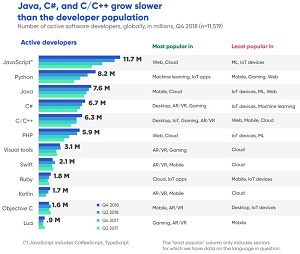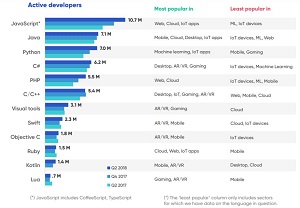News
Survey: Machine Learning/Data Science Propel Python Past Java
- By David Ramel
- April 11, 2019
A big new developer survey shows that Python has finally passed Java in the programming language popularity wars, propelled by its heavy use in machine learning and data science projects.
"Python has reached 8.2 million active developers and has taken the No. 2 spot, surpassing Java in terms of popularity," says the brand-new "Developer Economics State of the Developer Nation 16th Edition" report in which SlashData Ltd. polled more than 19,000 developers in 165 countries.
A previous edition of the survey last fall predicted that Python would overtake Java, stating: "Python has reached 7 million active developers and is closing in on Java in terms of popularity, thanks to 62 percent of machine learning developers and data scientists who now use Python."
The new report sees that "closing in" prediction coming true, noting that Python "is the second-fastest growing language community in absolute terms with 2.2 million net new Python developers in 2018. The rise of machine learning is a clear factor in its popularity. A whopping 69 percent of machine learning developers and data scientists now use Python (compared to 24 percent of them using R)."
And falling to No. 3 wasn't all of the bad news in the report for the venerable Java language, always grouped near the top of similar popularity rankings, as SlashData also noted its comparatively slower growth.
 [Click on image for larger view.]
Slow-Growing Languages (source: SlashData)
[Click on image for larger view.]
Slow-Growing Languages (source: SlashData)
"Java (7.6 million active developers), C# (6.7 million), and C/C++ (6.3 million) are fairly close together in terms of community size and are certainly well established languages. However, all three are now growing at a slower rate than the general developer population. While they are not exactly stagnating, they are no longer the first languages that (new) developers look to."
JavaScript, of course, retained its No. 1 position in this report -- as it does in most others -- based on its widespread use in Web development especially.
Here's a graphic from last fall's report that lists the fastest-growing languages at the time:
 [Click on image for larger view.]
JavaScript, Python and PHP Grew the Fastest in 2018 Report (source: SlashData)
[Click on image for larger view.]
JavaScript, Python and PHP Grew the Fastest in 2018 Report (source: SlashData)
Besides programming language rankings, the report by SlashData -- an analyst firm focusing on the developer economy -- highlighted five other main themes: ethics in AI; the gender wars; emerging technology; cloud native; and an agile software world.
Key highlights of the report as presented by SlashData include:
- Developers agree that they should not only ask for user consent to collect data and follow security and data protection laws but that they should also go above and beyond legal requirements - 72 percent of developers told us so.
- Blockchain and cryptocurrencies have been hyped as having great potential to be disruptive but for developers, they appear to have reached a plateau. We found that just 3 percent have adopted projects in either of these fields.
- More than half (58 percent) of developers say they follow a project management methodology that can be classified as agile. Scrum is the leading agile framework, used by 37 percent of developers.
- The once ruling waterfall methodology is currently used by only 15 percent of developers.
- Half of developers who teach AI, ML or data science have favorable views towards the ability of AI to behave in a moral and human-friendly way.
- Only around 30 percent of ML developers who develop algorithms for search engines or customer support management believe AI should not be used to replace human jobs as opposed to around 50 percent of those who develop stock market predictions or image classification/object recognition algorithms.
- Of the developers using orchestration tools or management platforms, 57 percent are working on DevOps. This compares to just 17 percent of the general developer population.
- The technology industry is still dominated by men. Women developers responding to our survey were outnumbered by men by a ratio of 1 to 10 (9 percent women and 91 percent men). This suggests a global population of 1.7 million women developers and 17 million men.
The methodology behind the report -- conducted November 2018 - February 2019 -- is detailed in the PDF and more generally here.
About the Author
David Ramel is an editor and writer at Converge 360.